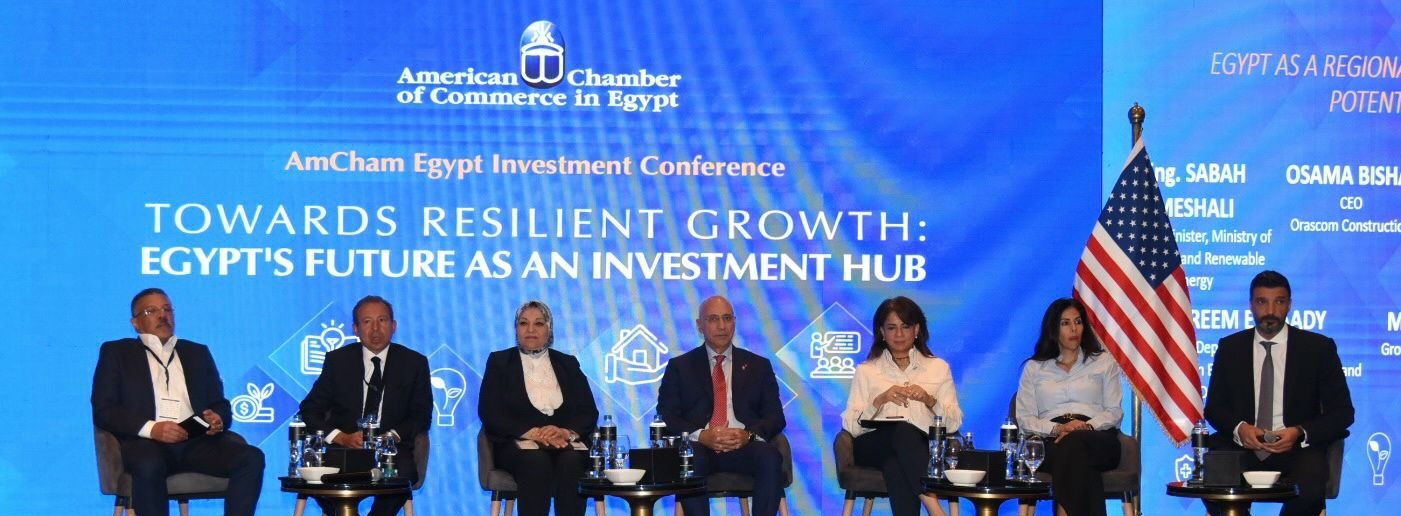At the second session of the American Chamber of Commerce in Egypt (AmCham) Investment Conference on April 29, titled “Egypt as a Regional Energy Hub: Unlocking the Potential of Renewables,” policymakers and energy experts gathered to discuss Egypt’s strategic drive to become a leading clean energy exporter in the Middle East and North Africa (MENA) region.
The session highlighted Egypt’s plans to leverage its abundant solar and wind resources to meet growing domestic demand and export electricity to neighboring countries and Europe.
“We are working to export energy to neighboring and European countries, mainly from renewable sources,” said Sabah Meshali, Deputy Minister at the Ministry of Electricity and Renewable Energy.
She emphasized ongoing efforts to secure renewable energy and upgrade Egypt’s national grid to handle increased capacity. Key projects include future energy links to Italy and Greece.
Grid expansion and fossil fuel reduction
During the session, Meshali stressed a recent reduction in fossil fuel consumption by around 7 grams per kilowatt-hour since October—demonstrating early gains in the country’s energy transition.
Meanwhile, Khaled Abubakr, Chairman of TAQA Arabia, noted that Egypt’s strategic location enhances its importance as a key transit point for trade and energy. He added that the East Mediterranean gas reserve offers a promising opportunity to supply Europe and other international markets with a cleaner energy source.
Reem El Saady, Deputy Head of Egypt at the European Bank for Reconstruction and Development (EBRD), detailed the bank’s support for Egypt’s transition through flagship projects such as the Benban Solar Park and the NWFE (Nexus of Water, Food, and Energy) platform. She revealed plans to decommission five gigawatts of fossil fuel capacity, with one gigawatt already retired, and all associated labor safely relocated.
However, El Saady cautioned that the national grid remains a key bottleneck. “Without proper grid expansion and the ability to evacuate renewable energy, we won’t meet our target of 42% renewables by 2030,” she said. She called for innovative, off-balance-sheet financing models and noted that EBRD is working with a major international investment bank to develop a blended finance structure to fund grid upgrades.
Private sector urges export-led strategy
Osama Bishai, CEO of Orascom Construction PLC, stressed the urgency of renewable development, citing Egypt’s limited fossil fuel reserves and strong natural advantages. “We don’t have enough gas to meet our power needs, but we have more than enough sun and wind,” he said, pointing to the Red Sea’s optimal wind conditions and high solar efficiency in the south.
On the other hand, Elsewedy Energy CEO Yehia Shankir called for a national renewable export strategy. “We should treat renewables as a source of national income. Our grid cannot absorb 80% renewable energy, so exporting is essential,” he said.
Merette Elsayed, Group Chief Commercial Officer at Hassan Allam Holdings, emphasized that reducing costs and generating additional revenue streams is essential to retaining investor interest. “Otherwise, investors will go elsewhere,” she warned. She also highlighted the growing role of artificial intelligence in modern energy systems, noting that countries like Spain have already integrated AI into their power grids. “AI is no longer a luxury,” she said. “It helps us predict grid demand, analyze weather forecasts and historical data, and anticipate equipment failures.” These predictions, she noted, save millions of dollars.
As Egypt races toward its 2030 renewable energy goals, its ability to address infrastructure gaps, secure investment, and implement a clear export plan will determine its role in the global energy transition.




